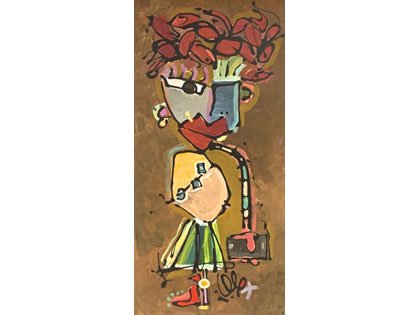BALTIMORE — “All children are artists. The problem is how to remain an artist once they grow up.” —Picasso
Picasso’s observation is the guiding philosophy of A Mother’s Love, a nonprofit organization dedicated to bringing art-based educational programs and experiences to troubled students.
“I have always loved this quote by Picasso,” says Alex Benitez, a professional artist. For the past year he has worked with a group of teenagers on probation after their first encounter with the juvenile system for anger or school disciplinary issues.
“It seems that most of us as adults lose the innocence and playfulness that we have as kids, allowing this supposed “necessary” transition to take place by default. To me, this hampers a lot of areas of our lives. Among them, creative thinking, emotional intelligence and the basic ability to enjoy the simple things in life. This is especially true for me as an artist, since I regularly search for that inner child to help me create some of the crazy things my mind allows me to put into the canvas.
With the kids I work with, it probably happens the other way around. They skim over the childhood phase and jump right into adulthood, complete with all the problems, responsibilities and heartaches that come with it. This is especially detrimental to their development as members of society, given the fact that they are ill-equipped to manage all these situations and the only outcome seems to be getting into trouble.”
Alex, using initials to protect the privacy of minor students writes:
As soon as you meet S., you are clearly made aware of a fact: “Nobody messes with S.” She is a very strong-willed girl, with a huge chip on her shoulder. The interesting juxtaposition is how sweet she can be as well. She could be the classic product of her environment, facing tough situations at an early age, forcing her to adopt this “tough girl” facade.
Her best friend is an iPhone, which she carefully decorated with letters and hearts during one of our craft projects. As many teenagers today, the connection with that little device is deep, making you wonder what she would do without it. Could this be a result of the lack of attention parents give these kids? Is it an escape? A necessity? Or js it a sign of the times? What effect is this having on her social skills and how is it molding her personality?
One day, as I was listening to the ever-entertaining conversations the girls’ group has, I asked S. (within the context of what she was saying) “who DO you trust then?”, to which she responded unequivocally: “I only trust myself.” This answer resonated loud within me. Is this alchemy of factors creating a sense of alienation within this girl? Did she mean to answer? I just trust myself AND my smart phone? Is this generation substituting personal relations with virtual ones? Maybe living in the cybernetic world feels better than the real one.
Besides this bit of faux-psychological analysis I made in my mind, S. is in fact a very smart girl. She also showed to be very creative with the art projects, probably one of the best. The combination of strong will and brains are a powerful one if put to good use. She said to me that she wants to be a nurse after she graduates from high school. The problem is she has repeated 8th grade twice. Who and how are we failing her?”
These compelling questions demand answers. Ignoring the needs of children, turning a blind eye to their dreams, wishes, and difficult circumstances will diminish the lives of us all.
There is a final opportunity to view the painting “S” and all the original artwork inspired by the humanity of these youngsters. Considered a rising talent, Alex Benitez’s joyful, color rich paintings have been shown and sold art at galleries in Miami, New York, and San Juan. The closing reception for his exhibit, “The Art of Alex: A Retrospective of My Year with the Kids@ Juvenile Services” is this Saturday, December 6, from 6 to 9 pm, at the Gallery at Emmanuel Episcopal Church, 811 Cathedral Street, Baltimore MD 21201. The event is free and open to the public.
Jayne Hopson writes about educational matters because in the words of Epictetus, former slave and Greek Stoic philosopher “only the educated are free”.
